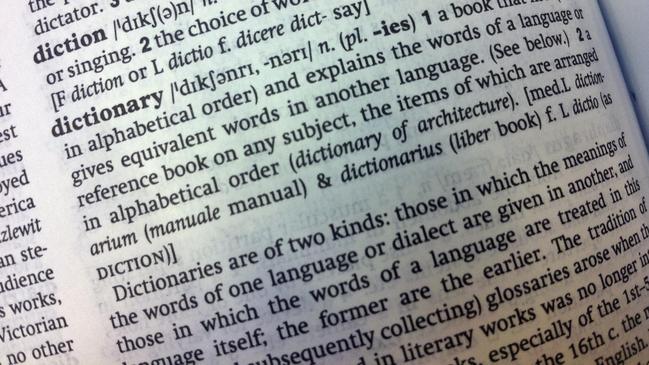
Take this book in your right hand – or left if you’re a mollydooker – and say after me: “This book contains all wisdom.” However, the volume in question is not the Bible but the dictionary. Preferably that masterpiece of scholarship, the Oxford English Dictionary.
With the complete Second Edition (1989) running to 20 heavy volumes, the Oxford is too cumbersome to hold unless you possess a forklift. So perhaps one of its mini-sized versions will have to do. My point is that a decent dictionary contains enough of the English vocabulary, enough words in waiting, for an infinite number of novels, dramas, sonnets, essays, letters and non-fiction books.
A jigsaw puzzle can only be fitted together one way. The words in a dictionary? Put them together anyway you like, and voilà, a tweet or a newspaper column. Just as musical notes can create everything from an improvised jazz solo to Beethoven’s 11th (or would have, had Ludwig lived a little longer), words words words (if you’re not sick of them like Eliza Doolittle) have the same unlimited potential. Ask Shakespeare, Tolstoy or any other wordsmith. Shuffle them together in the right order, add punctuation and avoid plagiarism, and you’re guaranteed a Booker, the Nobel Prize for Literature or both.
(There are, of course, other forms of language not included in a dictionary – such as the mysterious language of mathematics, used by an Einstein, a Hawking or any other explorer of the infinite. Cosmology and quantum mechanics eschew words for numbers, symbols and enigmatic equations squiggled on a backboard. Such language is entirely foreign to your author, who is yet to comprehend digital measurement.)
For a history of the dictionary I commend to you The Surgeon of Crowthorne, by that paradigm of pen-pushers, Simon Winchester. Or see the film version – The Professor and the Madman. The miracle of the Oxford will be revealed in all its improbabilities. Personally, after having made do for years with The Shorter Oxford or TheConcise, I finally splashed out and bought the real thing. It sits beside me in all its glory in a purpose-built cabinet as I type out these words. I rarely refer to it but like to know it’s there in an emergency. A literary version of a fire extinguisher or medicine cabinet. My first-born daughter, Dr Rebecca Adams, has demanded I leave it to her in my will.
Winchester explains its history with style – beginning with the Philological Society’s call in 1857 for a new English dictionary to take up where Samuel Johnson left off. Belatedly gaining momentum, the First Edition was completed in 1928. The Oxford was put on a CD-ROM in 1992 and is now being published online.
As if 273,000 words – 171,000 in current use – aren’t enough, newly minted words and phrases are constantly being added. Atrocities such as pawternity leave, Brexit, QAnon, woke and cancel culture – and inevitably Covid-19, PPE, frontliners, lockdown, mask-up and anti-mask. The phrase Black Lives Matter arrived and conspiracy theory has had a resurgence. The definition of trump has been updated and variants added. (Note to self: check to see how Roget’s Thesaurus, that literary Tyrannosaurus, is getting on.)
Does the Oxford ever cancel words? The answer is an emphatic no. Whereas the dead are immediately dropped from Who’s Who, once a word appears in the Oxford it’s there forever, fossilised in the geological layers of the English language. So, sadly, they will never dump Trump. See you later.



